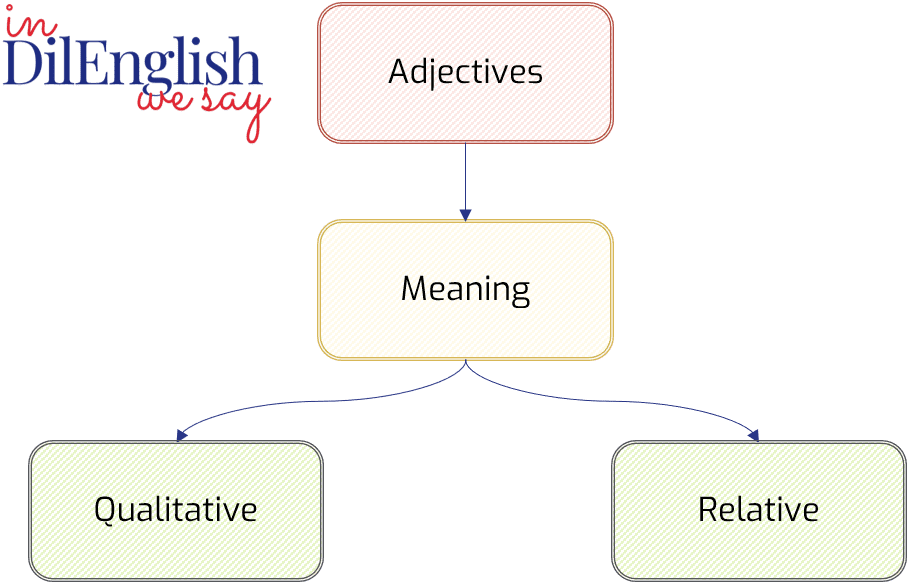According to their meaning and grammatical characteristics, adjectives fall under two classes: qualitative adjectives, and relative adjectives.

Qualitative adjectives denote qualities of a substance directly, not through its relation to another substance, as size, shape, colour, physical and mental qualities, qualities of general estimation:
little, large, high, soft, hard, warm, white, blue, pink, strong, hold, beautiful, important, necessary, etc.
Relative adjectives denote qualities of a substance through their relation to materials (silken, woollen, wooden), to place (Italian, Asian), to time (monthly, weekly), to some action (preparatory, rotatory).
Qualitative Adjectives
Most qualitative adjectives have degrees of comparison:
| big | bigger | (the) biggest |
| interesting | more interesting | (the) most interesting |
Some qualitative adjectives such as greenish, darkish, incurable, unsuitable, chief, principal, have no degrees of comparison.
They have certain typical suffixes, such as – ful, – less, – ous, – ent, – able, – y, – ish:
careful, careless, dangerous, convenient, comfortable, silvery, watery, whitish, shortish.
Most qualitative adjectives can be used as attributes and predicatives.
How lovely the little river is, with its dark, changing wavelets! (Eliot)(ATTRIBUTES)
The young man was introduced, and they sat down at the table. (Aldington)(ATTRIBUTE)
But you’re nearly as old as I am! (Aldington) (PREDICATIVE)
The Hartlys thought he was ‘rich’. George Augustus was so very comfortable… that he too really thought he was rich! (Aldington) (PREDICATIVES)
They form adverbs with the suffix – ly:
graceful — gracefully
happy-happily
Relative Adjectives
- Relative adjectives have no degrees of comparison.
- They do not form adverbs with the suffix – ly.
- They have certain typical suffixes, such as – en, – an, -ist, – ic, – ical: wooden, Italian, socialist, synthetic, analytical.
- Relative adjectives are mainly used as attributes.
…she was a fair example of the middle American class… (Dreiser) (ATTRIBUTE)
She had noticed a pretty wooden chain upon Gretel’s neck. (Dodge) (ATTRIBUTE)
“Certainly,” answered Hilda, looking kindly into the two earnest faces, and wishing from her heart that she had not spent so much of her monthly allowance for lace and finery. (Dodge)(ATTRIBUTE)
The morning was windy and sharp. (Saxton) (PREDICATIVE)
NOTE: It must be pointed out that no hard and fast line of demarcation exists between relative and qualitative adjectives. Compare: silken thread (relative adjective), but silken hair (qualitative adjective).
